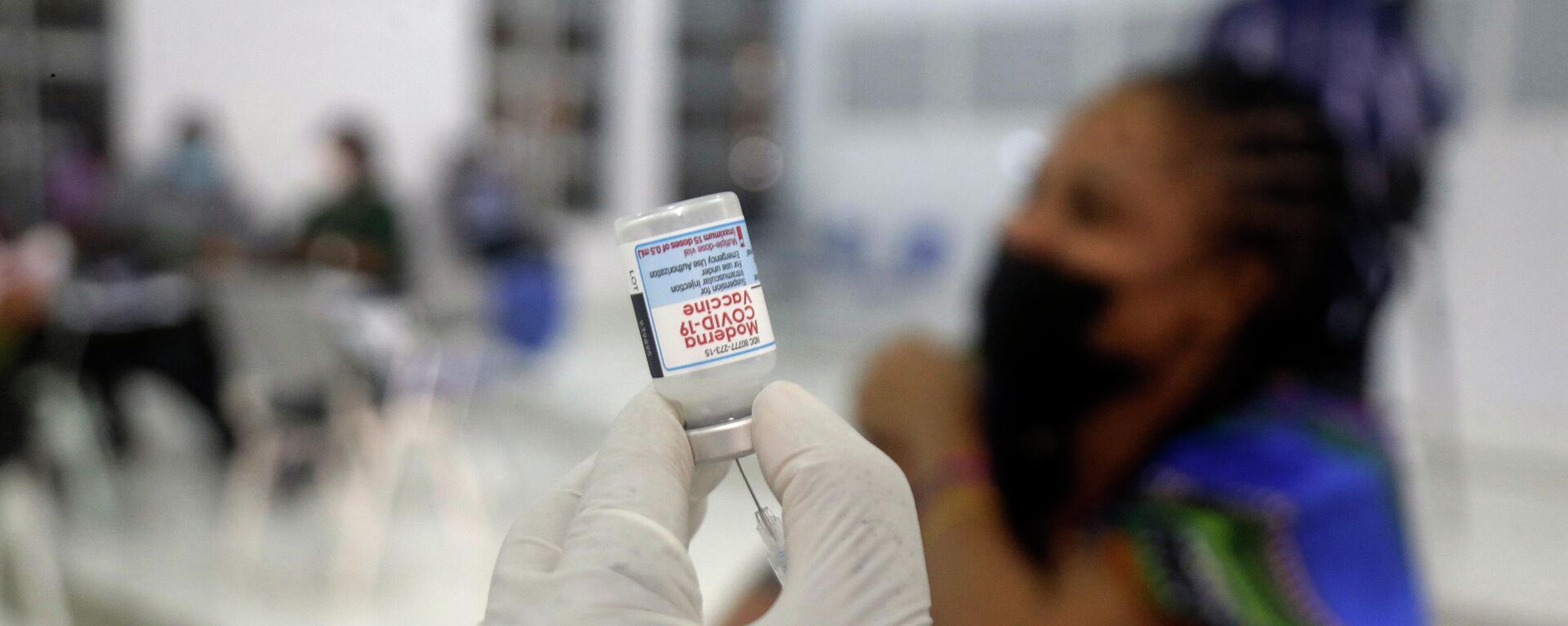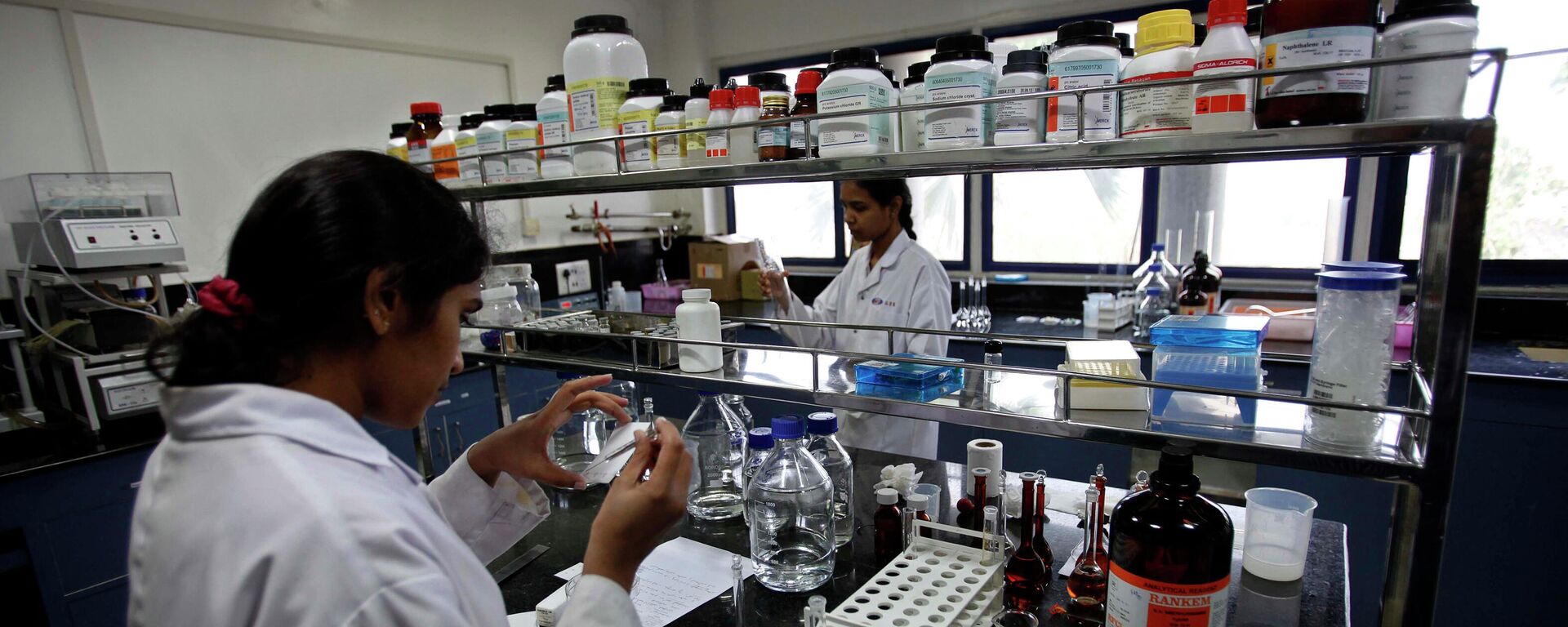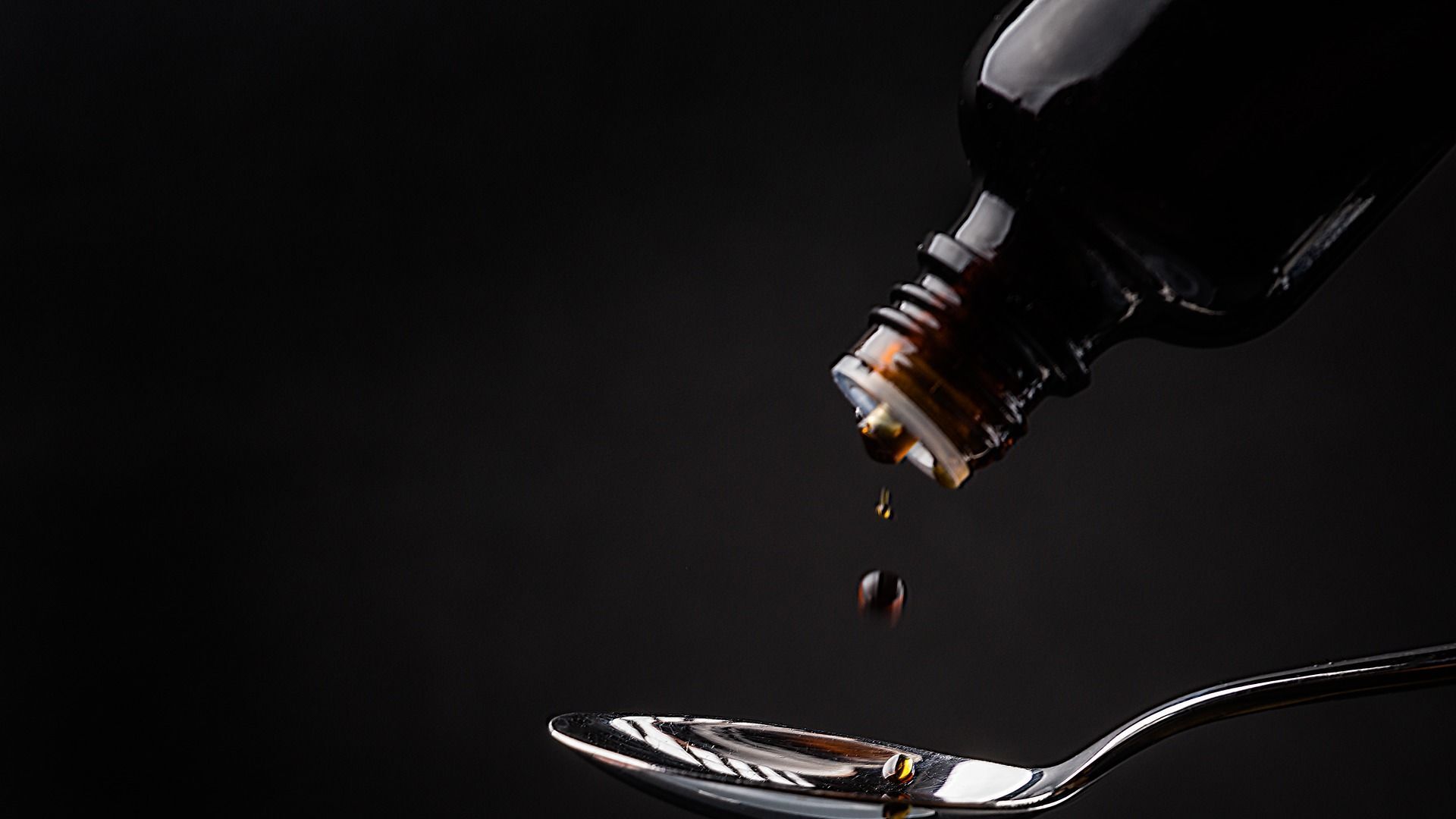https://sputnikglobe.com/20221007/pharma-products-among-key-targets-of-criminals-indian-health-experts-say-amid-cough-syrup-scandal-1101592203.html
Pharma Products Among Key Targets of Criminals, Indian Health Experts Say Amid Cough Syrup Scandal
Pharma Products Among Key Targets of Criminals, Indian Health Experts Say Amid Cough Syrup Scandal
Sputnik International
On Wednesday, the World Health Organization (WHO) issued a warning against four Indian-manufactured cough syrups that were found to be contaminated with... 07.10.2022, Sputnik International
2022-10-07T13:42+0000
2022-10-07T13:42+0000
2023-05-13T18:39+0000
india
contaminated products
pharma bro
pharmaceutical companies
pharmaceuticals
pharmacies
pharmaceuticals
children
children
death
https://cdn1.img.sputnikglobe.com/img/107840/93/1078409339_0:0:1920:1080_1920x0_80_0_0_461c4854828688d789c317fee8b08129.jpg
The use of contaminated diethylene glycol and ethylene glycol chemicals in cough syrup has been strongly criticized in the past as it has left several children ill and dead due to kidney and renal failure.Now, four Indian-made cough syrups have come under scrutiny after the WHO issued a warning against Promethazine Oral Solution, Kofexmalin Baby Cough Syrup, Makoff Baby Cough Syrup, and Magrip N Cold Syrup which were found to contain "unacceptable amounts of diethylene glycol and ethylene glycol as contaminants."While the manufacturers of the four alleged contaminated cough syrups - Maiden Pharmaceutical Limited -, which led to the death of 66 children in Gambia, remained unavailable for comment after frequent follow-ups, several pediatric doctors and pharma experts opened up to Sputnik about the horrific incident.Dr. Mahender Sukhija, senior consultant of pediatrics at Ujala Cygnus Brahm Shakti Sanjivani Hospital in Haryana state, told Sputnik that there is a connection between the latest incident in Gambia and the one in Jammu, in which around 12 children reportedly died and 17 got affected after consuming contaminated Coldbest cough syrup manufactured in the Kala Amb district of Himachal Pradesh state in March 2022.Diethylene glycol, also known as DEG, is a derivative of ethylene glycol that looks like propylene glycol and glycerin but has harmful effects: it can cause renal failure and affect the liver and central nervous systems.Some sellers have been found to use it illegally in adulterated medicines and other products as a sweetener or thickening agent.The use of toxic components diethylene glycol in pediatric cough syrup has previously left many children ill not just in India but also in Panama, Bangladesh, Nigeria, and the United States.The US Department of Health and Human Services, the Food and Drug Administration (FDA), and the Center for Drug Evaluation and Research (CDER) termed diethylene glycol a "poison" back in 2007 after the contaminant was found to be used in fake Colgate toothpaste and other medicinal products.Negligence or Lack of Awareness?Asked whether it was negligence on the part of the manufacturers or the lack of awareness about the contaminants in the medicines, Dr. Sukhija said, "both factors can be attributed to the cause of such incidents"."Manufacturers do not go for Internal Quality Control (IQC) of the product post-manufacturing," Dr. Sukhija said.While people often go for self-medication and buy medicines over the counter, doctors warn against such practices and stress that medicines like cough syrup should only be bought when a doctor prescribes them."A layman cannot check the ingredients nor calculate the quantity of medicine to be taken. It should be guided by a practitioner," he added.Impact on India's Pharma IndustryIndia, which is emerging as one of the biggest pharma hubs in the world for manufacturing and supplying vaccines and other medicines, is now marred with a bad reputation.Pharma expert and president of the Authentication Solution Provider's Association (ASPA), Nakul Pasricha, agreed, adding that the presence of spurious drugs hampers the brand equity of India in the global healthcare ecosystem.According to the experts, pharma products are found to be one of the key target areas of criminals who produce spurious or contaminated products, which could be life-threatening.Since the COVID-19 pandemic, Pasricha shared that the incidents of substandard and spurious medical products have increased by 47% from 2020 to 2021."This is a wake-up call that we need to accelerate our strategic fight against fake drugs immediately," he added.What Can Consumers Do?To make sure that the patient is not harmed by a fake drug or contaminated medicines, medical experts advise consumers to be vigilant while buying even simple medicines.He further added that because of easy access to technology, counterfeiters can produce close copies but most often are not able to perfect them."Use of these authentication and traceability solutions also helps in tracking the movement of the product in the supply chain, be it global or domestic. In case of such horrendous incidents, it can prove to be a great tool to aid investigation and find the problem point and the culprit," Pasricha concluded.
https://sputnikglobe.com/20220915/nigeria-strikes-deal-with-india-to-build-vaccine-plant-as-delhi-deepens-africa-ties-1100803059.html
https://sputnikglobe.com/20220915/indian-pharma-industry-likely-to-reach-130bln-by-2030---report-1100818989.html
west africa
Sputnik International
feedback@sputniknews.com
+74956456601
MIA „Rossiya Segodnya“
2022
Sangeeta Yadav
https://cdn1.img.sputnikglobe.com/img/07e4/08/1b/1080292803_0:121:960:1081_100x100_80_0_0_7490b319dab9611e309056b177265184.jpg
Sangeeta Yadav
https://cdn1.img.sputnikglobe.com/img/07e4/08/1b/1080292803_0:121:960:1081_100x100_80_0_0_7490b319dab9611e309056b177265184.jpg
News
en_EN
Sputnik International
feedback@sputniknews.com
+74956456601
MIA „Rossiya Segodnya“
Sputnik International
feedback@sputniknews.com
+74956456601
MIA „Rossiya Segodnya“
Sangeeta Yadav
https://cdn1.img.sputnikglobe.com/img/07e4/08/1b/1080292803_0:121:960:1081_100x100_80_0_0_7490b319dab9611e309056b177265184.jpg
india, contaminated products, pharma bro, pharmaceutical companies, pharmaceuticals, pharmacies, pharmaceuticals, children, children, death, death toll, west africa
india, contaminated products, pharma bro, pharmaceutical companies, pharmaceuticals, pharmacies, pharmaceuticals, children, children, death, death toll, west africa
Pharma Products Among Key Targets of Criminals, Indian Health Experts Say Amid Cough Syrup Scandal
13:42 GMT 07.10.2022 (Updated: 18:39 GMT 13.05.2023) On Wednesday, the World Health Organization (WHO) issued a warning against four Indian-manufactured cough syrups that were found to be contaminated with diethylene glycol and ethylene glycol. These cough syrups, according to the WHO, may have killed 66 children and left several others with acute kidney injuries in Gambia.
The use of contaminated diethylene glycol and ethylene glycol chemicals in cough syrup has been strongly criticized in the past as it has left several children ill and dead due to kidney and renal failure.
Now, four Indian-made cough syrups have
come under scrutiny after the WHO issued a warning against Promethazine Oral Solution, Kofexmalin Baby Cough Syrup, Makoff Baby Cough Syrup, and Magrip N Cold Syrup which were found to contain "unacceptable amounts of diethylene glycol and ethylene glycol as contaminants."
While the manufacturers of the four alleged contaminated cough syrups - Maiden Pharmaceutical Limited -, which led to the death of 66 children in Gambia, remained unavailable for comment after frequent follow-ups, several pediatric doctors and pharma experts opened up to Sputnik about the horrific incident.
Dr. Mahender Sukhija, senior consultant of pediatrics at Ujala Cygnus Brahm Shakti Sanjivani Hospital in Haryana state, told Sputnik that there is a connection between the latest incident in Gambia and the one in Jammu, in which around 12 children reportedly died and 17 got affected after consuming contaminated Coldbest cough syrup manufactured in the Kala Amb district of Himachal Pradesh state in March 2022.
"In both cases, the death of children happened due to the contaminated product - diethylene glycol - added to cough syrups to sweeten them," Dr. Sukhija said.
Diethylene glycol, also known as DEG, is a derivative of ethylene glycol that looks like propylene glycol and glycerin but has harmful effects: it can cause renal failure and affect the liver and central nervous systems.
Some sellers have been found to use it illegally in adulterated medicines and other products as a sweetener or thickening agent.
The use of toxic components diethylene glycol in pediatric cough syrup has previously left many children ill not just in India but also in Panama, Bangladesh, Nigeria, and the United States.

15 September 2022, 12:31 GMT
The US Department of Health and Human Services, the Food and Drug Administration (FDA), and the Center for Drug Evaluation and Research (CDER) termed diethylene glycol a "poison" back in 2007 after the contaminant was found to be used in fake Colgate toothpaste and other medicinal products.
Negligence or Lack of Awareness?
Asked whether it was negligence on the part of the manufacturers or the lack of awareness about the contaminants in the medicines, Dr. Sukhija said, "both factors can be attributed to the cause of such incidents".
"Manufacturers do not go for Internal Quality Control (IQC) of the product post-manufacturing," Dr. Sukhija said.
While people often go for self-medication and buy medicines over the counter, doctors warn against such practices and stress that medicines like cough syrup should only be bought when a doctor prescribes them.
According to Dr. Sukhija, citizens should not go for self-medication or rely upon unauthorized medical shops to purchase medicine: "medication is to be strictly done under the supervision and prescription of a registered medical practitioner like in western developed countries."
"A layman cannot check the ingredients nor calculate the quantity of medicine to be taken. It should be guided by a practitioner," he added.
Impact on India's Pharma Industry
India, which is emerging as one of the biggest pharma hubs in the world for manufacturing and supplying vaccines and other medicines, is now marred with a bad reputation.
"This incident has shattered the image of India’s pharmacy companies they would face real challenges to be acceptable to the Indian society and will also have to pass through stringent check measures adopted by Drugs Controller General of India (DGCI),” Dr. Sukhija said.

15 September 2022, 14:53 GMT
Pharma expert and president of the Authentication Solution Provider's Association (ASPA), Nakul Pasricha, agreed, adding that the presence of spurious drugs hampers the brand equity of India in the global healthcare ecosystem.
"It has taken years to build a good reputation but will take only a few incidents to damage the image and cause losses to the Indian pharma industry," Pasricha told Sputnik.
According to the experts, pharma products are found to be one of the key target areas of criminals who produce spurious or contaminated products, which could be life-threatening.
“While purchasing a cough syrup for children consumers can't even imagine that it could have horrific repercussions,” Pasricha said. "The cases need to be investigated thoroughly to understand the exact reason behind it and hold the culprit responsible."
Since the COVID-19 pandemic, Pasricha shared that the incidents of substandard and spurious medical products have increased by 47% from 2020 to 2021.
"This is a wake-up call that we need to accelerate our strategic fight against fake drugs immediately," he added.
To make sure that the patient is not harmed by a fake drug or contaminated medicines, medical experts advise consumers to be vigilant while buying even simple medicines.
"Many countries have a mandate to apply authentication and traceability solutions such as QR codes, bar codes, unique serial numbers, and others on the packaging of the medicine in addition to tamper-proof packaging. Any discrepancies in the packaging are a giveaway of it being fake," Pasricha said.
He further added that because of easy access to technology, counterfeiters can produce close copies but most often are not able to perfect them.
"Use of these authentication and traceability solutions also helps in tracking the movement of the product in the supply chain, be it global or domestic. In case of such horrendous incidents, it can prove to be a great tool to aid investigation and find the problem point and the culprit," Pasricha concluded.




